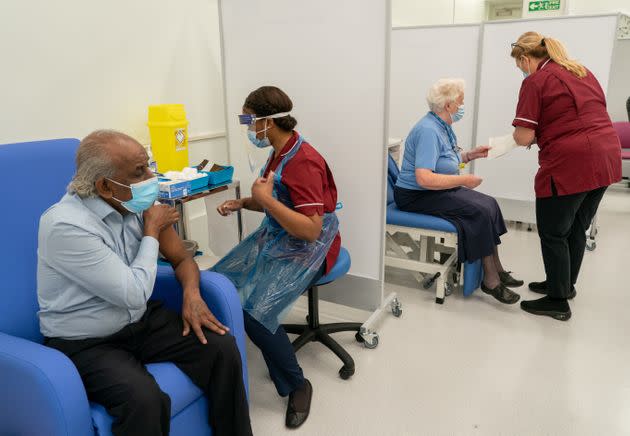Covid Vaccine Allergic Reaction: What You Need To Know
As the coronavirus vaccine rollout takes place across the UK, precautionary advice has been issued that anybody who has a history of “significant” allergic reactions to medicines, foods or vaccines should not receive the jab from Pfizer/BioNTech.
Both staff members had a significant history of allergic reactions – to the extent that they carried adrenaline auto-injectors with them. They are both now recovering well.
From Wednesday, anyone scheduled to receive the vaccination will be asked about their history of allergic reactions.
What is an anaphylactoid reaction?
Anaphylaxis is the result of the immune system, the body’s natural defence system, overreacting to a trigger. Symptoms include feeling lightheaded or faint, breathing difficulties, a fast heartbeat, collapsing or losing consciousness.
Anaphylaxis is a medical emergency and can be very serious if not treated quickly. The NHS advises people to call 999 and ask for an ambulance immediately if someone suffers anaphylaxis, and to use the person’s adrenaline auto-injector if they have one. (One type of auto-injector is an EpiPen, which you’ve probably heard of.)
Does this mean the vaccine isn’t safe?
No. There is always a small chance of experiencing an allergic reaction with any food or medicine.
Professor Stephen Evans, from the London School of Hygiene & Tropical Medicine told the BBC: “If you mean absolutely no adverse effect, then no vaccine is ‘safe’ and no drug is ‘safe’. Every effective medicine has unwanted effects.
“What I mean by safe is the balance of unwanted effects compared with the benefit is very clearly in favour of the benefit.”

According to research, anaphylaxis to vaccines occurs in about 1 in 760,000 vaccinations. You are more likely to be struck by lightning (1 in 700,000). The UK has one of the highest coronavirus death rates in...


